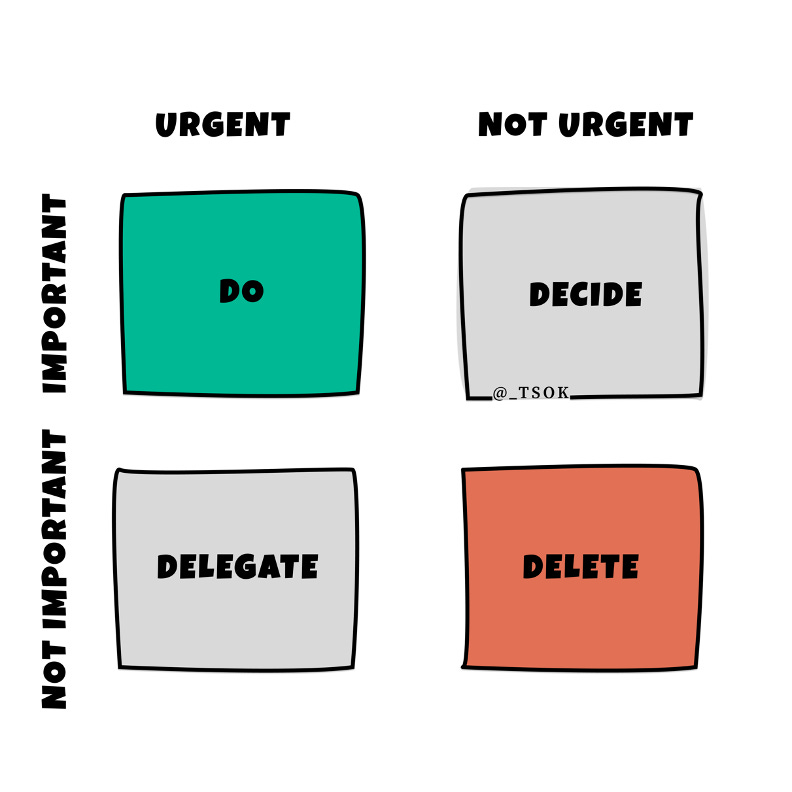A few weeks ago, I sent a thread asking my subscribers if they needed help with anything. This article is dedicated to Drew, who was struggling with something similar to what I have, and I’m sure everyone else has, at some point–balancing responsibilities with living life.
I hope you find today’s article helpful in pursuing the things you love.
We all have the same 24 hours in a day, but how we use those hours can make all the difference between a life of fulfilment and one of frustration. Mastering time management isn't about squeezing every second for productivity—it's about balancing your responsibilities with the things that truly bring you joy.
Drawing inspiration from Charlie Munger’s approach to decision-making and efficiency, we’ll explore practical ways to handle your "like-to-do" tasks while staying on top of your "have-to-do" responsibilities. By the end, you’ll have tools and techniques to help you achieve more without sacrificing the things you love.
1. Recognising Cognitive Misjudgments: Avoiding Time Traps
Munger often discusses how cognitive biases lead to poor decision-making. The same principles apply to time management. We can easily misjudge the importance of certain tasks because of emotional attachments or the lure of immediate gratification. This results in spending time on low-priority activities that don't move the needle forward.
Action Step:
At the start of each week, create a task matrix such as the Eisenhower Matrix. Separate your tasks into four categories:
Urgent and Important (Do first)
Important but Not Urgent (Schedule)
Urgent but Not Important (Delegate)
Not Urgent and Not Important (Eliminate)
By categorising tasks this way, you can avoid cognitive traps that cause you to waste time on the wrong priorities.
Here’s a visual to help explain.
2. Plan Deep Work Everyday
Munger’s success stems from his ability to focus deeply on what matters. The same principle applies to time management. Deep work refers to periods of focused, undistracted effort on a single task. It’s during these periods that you produce your best work. Shallow work—multitasking, checking emails, with constant interruptions—dilutes your effectiveness.
Action Step:
Dedicate 1-2 (more if you can) hours daily to do deep work. Turn off notifications, close unnecessary tabs, and focus solely on one task. The Pomodoro Technique can help here: work for 25 minutes, then take a 5-minute break. After four cycles, take a longer break. These focused sessions will help you accomplish more in less time. If you struggle to find the time, you need to make the time, even if it’s just 30 minutes a day to start.
3. Time Blocking: Structuring Your Day for Success
Time blocking is a powerful method where you allocate specific blocks of time to different tasks throughout your day. By planning your work in chunks, you avoid constantly switching between tasks that eat up precious time. When done correctly, time blocking ensures that both your have-to-do tasks and like-to-do activities get the attention they deserve.
Action Step:
Create a daily schedule by assigning 1-2 hour blocks for focused work on your most important tasks. For instance, allocate mornings for high-priority work and reserve afternoons or evenings for administrative work or smaller responsibilities. Schedule breaks and downtime for yourself as well—this is when you can indulge in the things you love without guilt, knowing that your important work is done. This could be as simple as every other minute after your deep work.
4. Avoid Perfectionism: The 80% Rule
Perfectionism is a major time sink. Munger often emphasizes the importance of doing things well, but not obsessing over making everything perfect. Aiming for perfection can prevent you from completing tasks efficiently. Instead, strive for 80% completion, which often yields results that are good enough to move forward without wasting excessive time on diminishing returns.
Action Step:
When working on a task, aim to get it 80% done before moving on. Ask yourself, "Is this good enough to achieve the intended result?" If the answer is yes, avoid the trap of over-editing or polishing. This mindset shift can save you countless hours in the long run, and you'll find that most tasks don’t require perfection to be effective.
5. Opportunity Cost
Opportunity cost is a fundamental concept in economics and decision-making that refers to the value of the next best alternative that is foregone when a choice is made. In simpler terms, it’s what you give up to pursue a particular option.
Key Points:
1. Choice and Trade-offs: Every time you make a decision, you have to consider the alternatives. Choosing one option means you can’t choose another, and the opportunity cost is the value of that unchosen alternative.
2. Not Just Financial: While opportunity cost is often associated with money, it applies to time, resources, and anything else of value. For example, if you spend time studying for an exam instead of going out with friends, the opportunity cost is the enjoyment and experiences you miss by not spending time with them.
3. Decision-Making Tool: Understanding opportunity cost helps you make more informed decisions. By evaluating what you’re giving up with each choice, you can better assess the potential benefits of different options.
4. Real-Life Examples:
Education: If you decide not to go to college to earn money now you forgo potentially better opportunities years down the line.
Investments: If you invest in stocks instead of bonds, the opportunity cost is the returns you could have earned from the bonds if stocks underperform.
Action Step:
Opportunity cost encourages a more comprehensive evaluation of choices. It reminds us that every decision has consequences beyond the immediate benefits, urging us to think critically about what we value most. This mental model can enhance your decision-making process, whether in personal finance, career planning, or everyday life.
Putting it all Together
Working, studying, family and other responsibilities eat up almost all of our time. Then, whatever time we have left is usually spent physically exhausted but mentally aware that we need or should be doing something.
Personally, I get up at 5 am to read for 30 minutes and then work on my newsletter. I could choose to read in the evenings, but because I get my material from books and articles to write my newsletter, it must be undistracted. After working for about 2 hours, my most important work is done for the day. The rest of the day is split between keeping on top of and engaging with my community, uploading new content (which is planned on Sundays for the week and uploaded to Notion/Google Drive) and then, in the evenings, whatever I feel like, if I feel like doing anything at all. Usually, reading or editing my book notes. This is the ‘guilt-free’ time.
As Munger often advises, constant improvement is key to success. To get better at managing your time, you must be willing to review your systems and make adjustments. Track how you’re spending your time each week and evaluate which strategies are working and which aren’t.
For this, I use a simple accountability template I made called the Monthly Personal Board Meeting. You can grab this for free here.
Final Thoughts: Achieving Balance with Purpose
Time management isn’t about squeezing out every second of productivity—it’s about aligning your time with your values. By following the principles of prioritisation, focus, and continuous improvement, you can create more time for the things you love without neglecting your responsibilities. It’s just hard and requires introspection and rejigging. Remember, actions express priorities!
As Charlie Munger says, "The big ideas are simple." Master these few strategies, and you’ll find that balancing what you must do with what you love to do becomes second nature.
Whenever you’re ready
The School of Knowledge helps entrepreneurs and professionals convert worldly wisdom from books into actionable insights.📚💡
Consider joining our growing community of like-minded lifelong learners.






Since I came to uni I really understood the importance of time management.
I have to prioritize and systemize school work to make time for working on writing and prioritize and systemize writing to make time for gym and theater classes.
That's a skill I'm always keen to getting better at, and your letter was a great reminder. Well done Karl 👍
Very helpful! Thank you